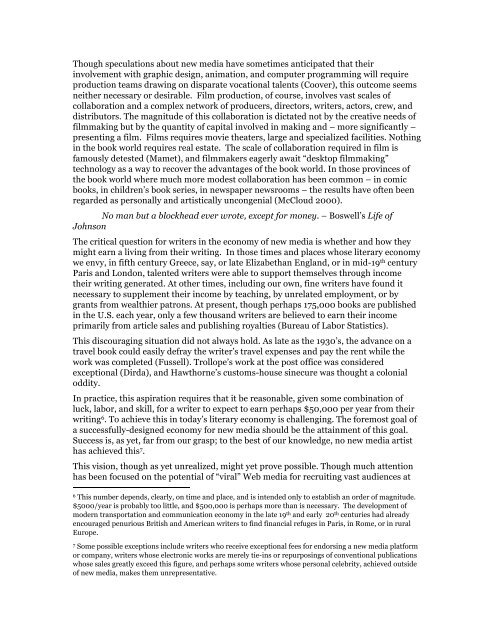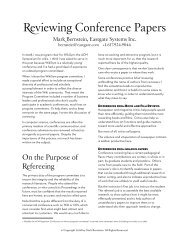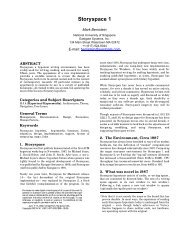Genre: Designing a New Media Economy - Mark Bernstein
Genre: Designing a New Media Economy - Mark Bernstein
Genre: Designing a New Media Economy - Mark Bernstein
You also want an ePaper? Increase the reach of your titles
YUMPU automatically turns print PDFs into web optimized ePapers that Google loves.
Though speculations about new media have sometimes anticipated that theirinvolvement with graphic design, animation, and computer programming will requireproduction teams drawing on disparate vocational talents (Coover), this outcome seemsneither necessary or desirable. Film production, of course, involves vast scales ofcollaboration and a complex network of producers, directors, writers, actors, crew, anddistributors. The magnitude of this collaboration is dictated not by the creative needs offilmmaking but by the quantity of capital involved in making and – more significantly –presenting a film. Films requires movie theaters, large and specialized facilities. Nothingin the book world requires real estate. The scale of collaboration required in film isfamously detested (Mamet), and filmmakers eagerly await “desktop filmmaking”technology as a way to recover the advantages of the book world. In those provinces ofthe book world where much more modest collaboration has been common – in comicbooks, in children’s book series, in newspaper newsrooms – the results have often beenregarded as personally and artistically uncongenial (McCloud 2000).No man but a blockhead ever wrote, except for money. – Boswell’s Life ofJohnsonThe critical question for writers in the economy of new media is whether and how theymight earn a living from their writing. In those times and places whose literary economywe envy, in fifth century Greece, say, or late Elizabethan England, or in mid-19 th centuryParis and London, talented writers were able to support themselves through incometheir writing generated. At other times, including our own, fine writers have found itnecessary to supplement their income by teaching, by unrelated employment, or bygrants from wealthier patrons. At present, though perhaps 175,000 books are publishedin the U.S. each year, only a few thousand writers are believed to earn their incomeprimarily from article sales and publishing royalties (Bureau of Labor Statistics).This discouraging situation did not always hold. As late as the 1930’s, the advance on atravel book could easily defray the writer’s travel expenses and pay the rent while thework was completed (Fussell). Trollope’s work at the post office was consideredexceptional (Dirda), and Hawthorne’s customs-house sinecure was thought a colonialoddity.In practice, this aspiration requires that it be reasonable, given some combination ofluck, labor, and skill, for a writer to expect to earn perhaps $50,000 per year from theirwriting 6 . To achieve this in today’s literary economy is challenging. The foremost goal ofa successfully-designed economy for new media should be the attainment of this goal.Success is, as yet, far from our grasp; to the best of our knowledge, no new media artisthas achieved this 7 .This vision, though as yet unrealized, might yet prove possible. Though much attentionhas been focused on the potential of “viral” Web media for recruiting vast audiences at6This number depends, clearly, on time and place, and is intended only to establish an order of magnitude.$5000/year is probably too little, and $500,000 is perhaps more than is necessary. The development ofmodern transportation and communication economy in the late 19 th and early 20 th centuries had alreadyencouraged penurious British and American writers to find financial refuges in Paris, in Rome, or in ruralEurope.7Some possible exceptions include writers who receive exceptional fees for endorsing a new media platformor company, writers whose electronic works are merely tie-ins or repurposings of conventional publicationswhose sales greatly exceed this figure, and perhaps some writers whose personal celebrity, achieved outsideof new media, makes them unrepresentative.




